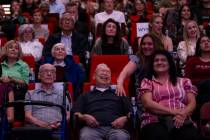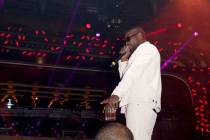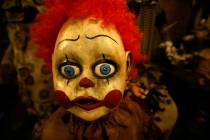‘Bad Jews’ attracts attention with scathing comic theme






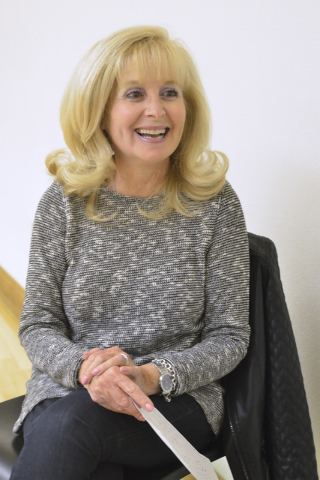
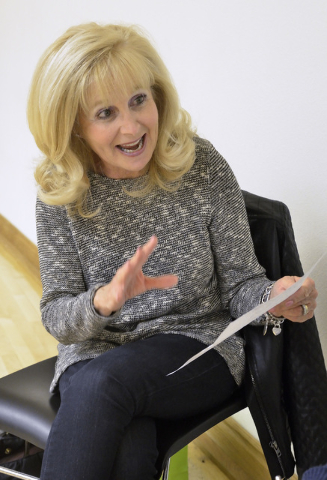
What’s in a name?
When the name of the play is “Bad Jews,” a clue — and a controversy magnet.
Despite such raves as “blisteringly funny” and “I thought I’d died and gone to comic heaven” — including a five-star rating from a Jewish newspaper — London’s transport agency banned “Bad Jews” posters from the British capital’s subway stations because they could “cause widespread or serious offence.”
And when Jewish Repertory Theatre of Nevada announced its production (at The Smith Center’s Troesh Studio Theater through Sunday), one local called artistic director Norma Morrow and asked if the title could be changed.
Clearly, “Bad Jews” playwright Joshua Harmon has struck a nerve. Make that more than one.
“That’s an interesting thing about that title,” says Morrow, who’s directing the production. “Many people of a certain generation think it’s a terrible title.”
Yet “younger people don’t object,” she adds. And “this is a play about younger people, written by a younger playwright. If you see the play, you will understand why he calls it that.”
Provocative title aside, “Bad Jews” has become one of the most produced plays in the U.S. since its 2012 off-Broadway debut, which was so successful the show moved from a 62-seat theater to a 424-seat playhouse.
Subsequent productions in Chicago and Los Angeles, where “Bad Jews” racked up extended runs, demonstrated its drawing power.
Clearly, “it resonates with many people,” Morrow observes.
And while it deals with plenty of Jewish concerns, “Bad Jews” also explores territory familiar to anyone who has a family.
Invariably, “in every family, there’s somebody who thinks they’re better than the next guy,” Morrow points out. “That’s a given.”
In the “Bad Jews” family, that somebody is Daphna — formerly Diane — Feygenbaum (played by Stefanie Resnick).
An assertive (some might say obnoxious) college student, Daphna has her post-graduate life all planned. As soon as she graduates from Vassar, she’s moving to Israel, marrying her Israeli boyfriend — and studying Torah with a female vegan rabbi she’s discovered.
Before any of that can happen, however, Daphna and her cousins must survive the aftermath of their beloved grandfather’s “intensely intense” funeral.
Following the death of a loved one, some families bond and find solace together.
This family’s too busy battling to see who will inherit their Holocaust survivor grandfather’s treasured “chai” (“life”) necklace, which “Poppy” hid in his mouth during his concentration camp years.
The holier-than-thou Daphna’s at one end of the power struggle, arguing that — as the family’s most dedicated Jew — she should have it.
Not if her cousin Liam Haber (Sam Cordes) has anything to say about it. And he does — plenty.
Unlike the uber-observant Daphna, Liam’s the self-described “bad Jew” of the title, a secular atheist with a non-Jewish fiancee (Madison Kisst) and an almost allergic reaction to Daphna and her “chosen people talk.”
Liam’s just as determined to claim Poppy’s “Chai” — and give it to Melody when he proposes to her, just as Poppy did decades earlier with his grandmother.
As for the young man in the middle, Liam’s brother Jonah (Carson Wilson) is vainly trying to stay above the vitriolic fray.
The spark for “Bad Jews” came when playwright Harmon was in college and attended a Holocaust memorial service for grandchildren of survivors.
“So, instead of having a survivor speak, it was peers at college talking about their grandparents’ experiences, and I found it really unmoving,” Harmon told the Wall Street Journal. “I left feeling a little shaken up.”
Although Harmon doesn’t consider his characters “talking heads,” he told the newspaper, “if you’re a young Jewish person who’s engaged at all with your religion … you’ve met people who are incredibly invested in it, and people who are incredibly dismissive of it, and everything in between.”
As Morrow and her cast members rehearse in a UNLV studio (“we’re an all-UNLV production,” she notes, “even me — I’m in the master’s program”), the contrasting perspectives fly fast — and loud.
“Once it’s gone, you can’t get it back,” Daphna tells Liam, arguing in favor of maintaining Jewish traditions.
“You’re the one who sounds like a Nazi,” Liam charges.
Although “Bad Jews” brims with biting humor, “I don’t think the theater is always just fun,” Morrow says. “Even in the laughter and humor, you’ll think.”
The operative phrase, she adds, is “food for thought.” So eat, babelahs, eat.
Read more stories from Carol Cling at reviewjournal.com. Contact her at ccling@reviewjournal.com and follow @CarolSCling on Twitter.
Preview What: “Bad Jews” When: 8 p.m. Thursday-Saturday, 2 p.m. Sunday Where: Troesh Studio Theater, The Smith Center for the Performing Arts, 361Symphony Park Ave. Tickets: $35-$45 (702-749-2000, www.thesmithcenter.com)









